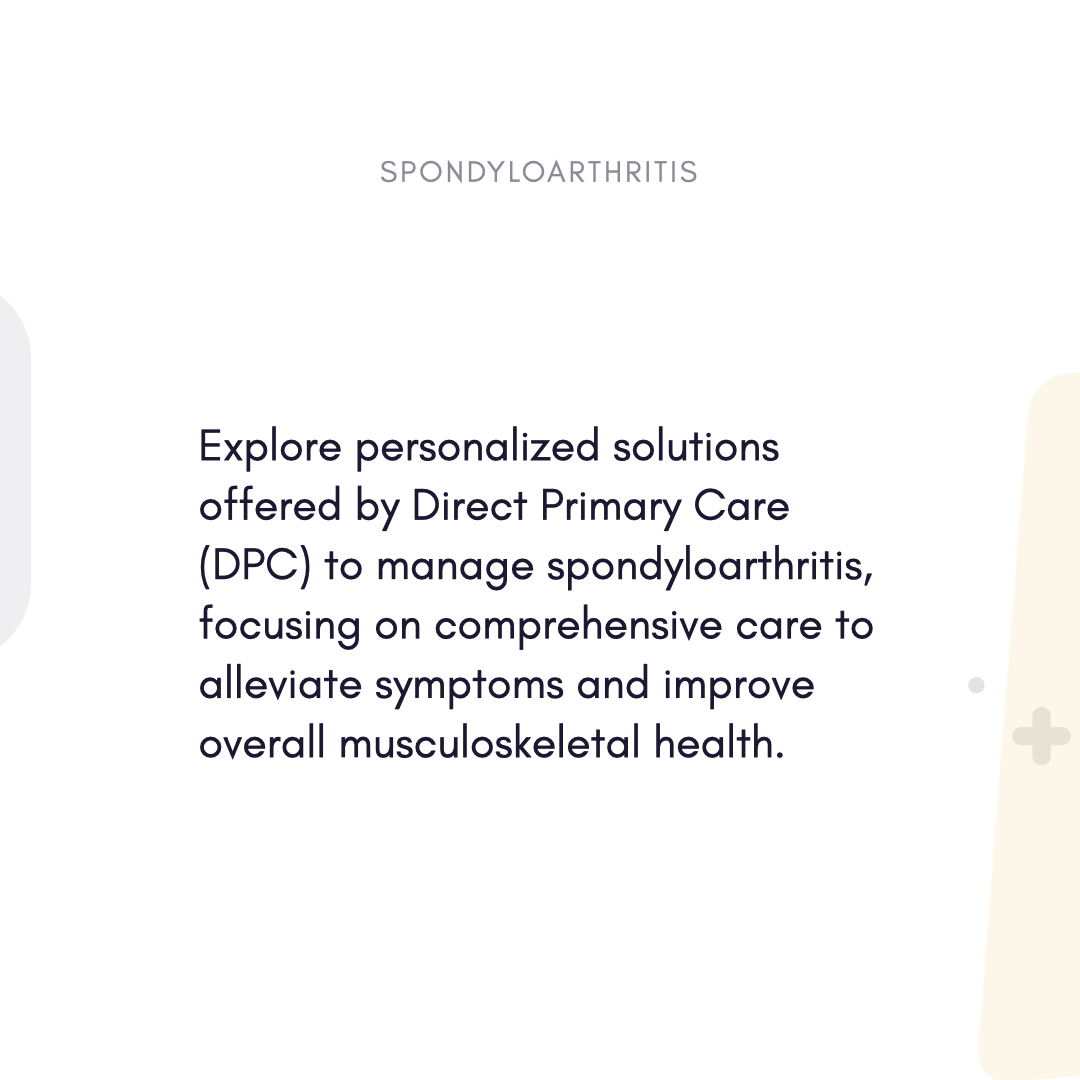Spondyloarthritis and Direct Primary Care (DPC): A Path to Personalized, Proactive Relief
You know the constant load of spondyloarthritis if you have ever experienced morning stiffness so severe it takes hours to "unlock" your spine or felt chronic lower back pain radiating into your hips and legs. Affecting three million Americans, this inflammatory disorder often causes joint damage, tiredness, and limited mobility. Direct Primary Care (DPC), which combines timely treatment, cost transparency, and care catered to your particular need, presents a patient-centered approach to manage spondyloarthritis, though.

Understanding Spondyloarthritis and Its Difficulties
A collection of inflammatory diseases affecting the spine, sacroiliac joints, and entheses—where tendons or ligaments bind to bone—spondyloarthritis (SpA) There are subtypes as:
- Fusion of spinal vertebrae defines ankylosing spondylitis (AS).
- Linked to psoriasis, psoriatic arthritis (PsA)
- Related with IBD (Crohn's, ulcerative colitis), enteropathic arthritis exists.
Typical ailments:
- Increasing lower back/hip pain even at rest
- Morning stiffness lasting more than thirty minutes
- Dactylitis, swollen fingers or toes; enthesitis, heel pain
- Skin plaques or uveitis, an eye inflammation
Long-term hazards of uncontrolled SpA:
- Spinal fusion, limited lung capacity
- Chronic inflammation-induced cardiovascular disease
- Mental health suffers and disabilities worsen.
How DPC Changes Spondyloarthritis Care:
Under the membership model known as Direct Primary Care (DPC), patients pay a monthly fee—usually 50 USD–150 USD—for unlimited access to their main care physician. For SpA patients, this entails no surprise bills, no waiting months for a rheumatologist, and treatment aimed at slowing down advancement and preserving mobility.
Here's why DPC distinguishes itself:
1. Timely, Guideline-Driven Medical Treatment
DPC doctors use American College of Rheumatology and Spondylitis Association of America guidelines including:
- Early diagnosis: To verify SpA before permanent damage results from imaging (X-rays/MRIs) and blood tests (HLA-B27, CRP).
- Prescribing NSAIDs (such as celecoxib) or DMARDs (such sulfasalazine) to lower inflammation first line treatments.
- Securing TNF inhibitors (e.g., adalimumab) or IL-17 blockers for moderate-severe cases at negotiated prices will help with biologic coordination.
2. Reasonably priced, holistic treatment
- By providing generic NSAIDs at wholesale rates—e.g., meloxicam for 5 USD/month—DPC clinics lower costs.
- Working with nearby PTs for programs involving cash-pay spinal stabilization.
- Steering clear of needless specialist referrals for stable patients.
3. Constant, patient-centered help
- Having 24/7 access to your DPC doctor allows you to: change prescriptions during flares—that is, short-term prednisone tapers.
- Track symptoms in digital journals to find triggers—stress, infections.
- Treat comorbidities including depression associated with chronic pain or osteoporosis.
DPC Benefits for Spondyloarthritis Patients: Individualized Care Plans
Each visit, DPC doctors spend 30 to 60 minutes developing plans including:
- Customized exercise regimens for spinal flexibility: Pilates, swimming, or yoga.
- Dietary anti-inflammatory strategies call for Mediterranean diets high in omega-3s, turmeric, and vitamin D.
- Integrative therapies include CBT for stress control and acupuncture for pain.
Saving Money
- No co-pays for flares-related urgent consultations.
- Pre-negotiated pharmacy relationships allow biologic drugs at 20–40% less.
- Proactive flare management helps to prevent ER visits.
Expert Cooperation
Should advanced treatment be required, DPC doctors:
- Share your history and fast rheumatologist referrals help to prevent unnecessary testing.
- Coordinate discounted imaging—that is, MRIs for 500 USD instead of 2,500 USD+.
- Track for side effects from medications, including liver/kidney function with DMARDs.
Personal Success Stories from Real Life
- Case 1: Maria, 34, battled undiagnosed uveitis and back trouble. Her DPC physician confirmed AS, ordered HLA-B27 testing, and began adalimumab—which helps to lower monthly to twice annual flare frequency.
- Case 2: John, fifty, skipped PT for financial reasons. His DPC clinic linked him with a low-cost spinal mobility program, which in eight weeks corrected his posture and pain.
Ask questions about spondyloarthritis and DPC.
- Q: Can DPC handle complicated problems needing biologics?
- A: Agreed. Negotiating reduced costs, DPC doctors coordinate prior authorizations, track efficacy, and switch biologics if necessary.
- Q: For conditions like AS, is DPC reasonably priced?
- A: Without a doubt. Comparatively to conventional insurance models, members save 1,000 USD+/year on specialists, imaging, and medications.
- Q: If I require a rheumatologist, what then?
- A: A DPC provider will typically secure cash-pay discounts for consultations and simplify referrals.
Why DPC Will Help SpA Patients Win?
Leading rheumatology societies stress early intervention and patient education. DPC shines in:
- Early inflammation prevention: slowing joint damage before it turns irreversible.
- Teaching self-management skills to help patients rely less on drugs.
- Simplifying treatment: One fixed monthly cost pays for unlimited visits, messaging, and care coordination.
Use DPC to Reclaim Your Life
Spondyloarthritis does not define your daily life. With DPC, you find a partner who listens, creative thinker who gives your mobility and comfort top priority—every stage of the process.






